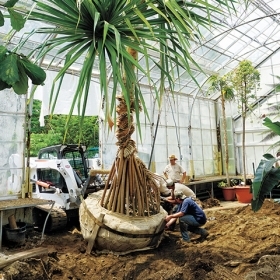©2017 Harry Campbell c/o theispot.com
Environmental Studies at Wellesley is an interdisciplinary program, with four dedicated faculty members, four other advising faculty in the geosciences, biology, and philosophy departments, and a staff program coordinator. Currently, 34 students are majoring in ES, with eight additional minors. Through coursework, directed research, field trips, and internships, they focus on topics ranging from environmental ethics to conservation ecology. The program puts out a weekly newsletter for students and alumnae with events and job listings—and tips for living sustainably. The suggestions below are adapted from their 2016–17 newsletters.
Greener Cleaners
Store-bought cleaners typically contain dangerous chemicals, contribute to greenhouse gas emissions, and are packaged in petroleum-based products. Avoid bringing those dangerous fumes and environmental harms into your home by making your own low-impact cleaners. A simple solution of warm water, lemon juice, and vinegar can clean almost any surface. For additional cleaning properties, add essential oils or baking soda to your cleaner.
Appliance Maintenance
Don’t skip tune-ups: Good maintenance usually equals efficiency. Care for your appliances, and they will reward you with lower energy costs and longer operating lives.
• Car: Follow the scheduled service guidelines for your car and keep the tires properly inflated.
• Refrigerator: Keep the coils on the back of your refrigerator clean.
• Heating and cooling: Change the air filter in your air conditioning unit and periodically tune up your furnace. Turn off fans, heaters, and air conditioning units before leaving a room.
Look at the Labels
These days, there are so many labels on the food and products we buy. Here is a list of some labels that are worth taking note of:
• Fair Trade. Fair-trade certified companies mean workers are getting fair wages and farmers are getting fair prices for their crops.
• Shade Grown or Bird Friendly. If you are buying coffee, look out for shade-grown labels. Shade-grown coffee keeps forest habitats intact for birds and other species.
• Organic. Organic certified products mean fewer pesticides and other harmful chemicals being put into the environment and into you!
For more information about environmental studies at Wellesley, visit www.wellesley.edu/environmentalstudies.







We ask that those who engage in Wellesley magazine's online community act with honesty, integrity, and respect. (Remember the honor code, alums?) We reserve the right to remove comments by impersonators or comments that are not civil and relevant to the subject at hand. By posting here, you are permitting Wellesley magazine to edit and republish your comment in all media. Please remember that all posts are public.